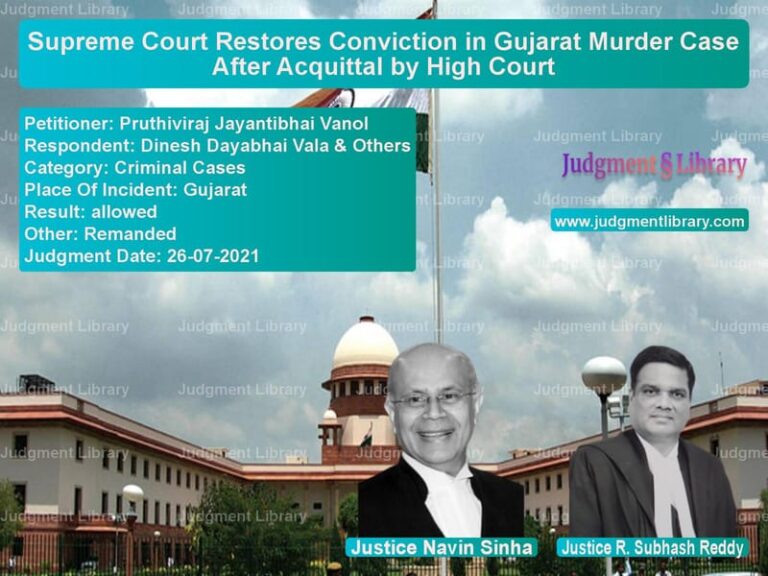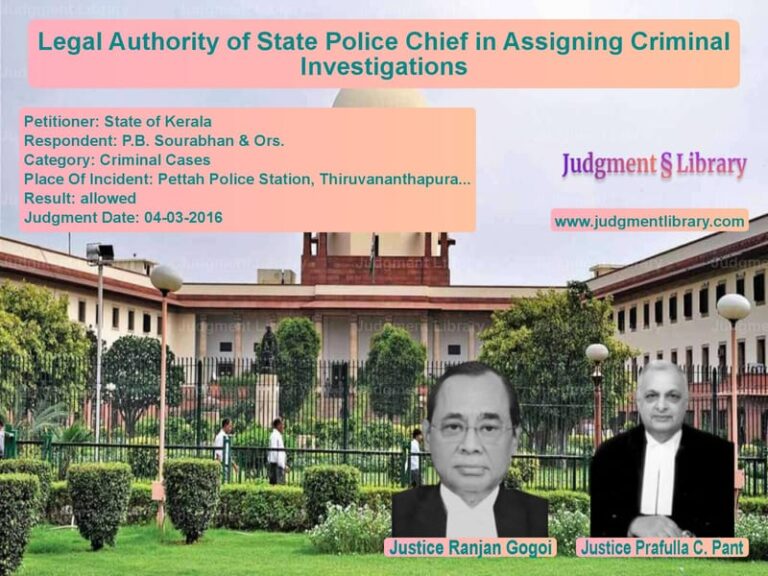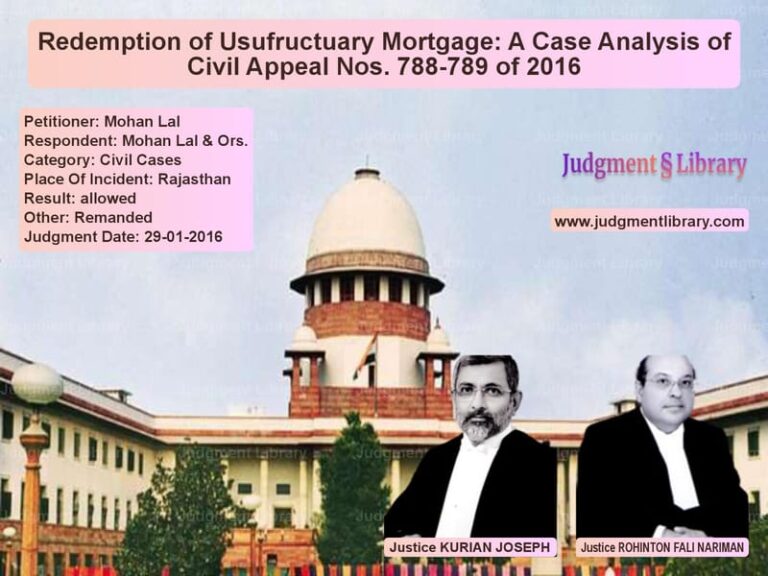Land Dispute and Review Petition: Union of India vs. Nareshkumar Badrikumar Jagad
The case of Union of India vs. Nareshkumar Badrikumar Jagad revolved around a dispute concerning leasehold property occupied by the National Textile Corporation (NTC). This dispute led to multiple rounds of litigation, culminating in a review petition before the Supreme Court of India. The case involved property located at Lower Parel, Mumbai, originally leased to Podar Mills Ltd. The primary legal contention was whether the tenancy rights in the suit property had vested absolutely in the Central Government under the Textile Undertakings (Nationalisation) Act, 1995.
The Supreme Court was required to determine the legal status of NTC’s occupation, the impact of the 2014 amendment to the Textile Undertakings Act, and whether eviction proceedings against NTC were legally valid.
Background of the Case
The property in question measured approximately 12,118 square yards and was originally leased for 99 years, expiring in 1990. Following the expiration, the tenants continued in occupation under statutory tenancy protections. Over time, Parliament enacted the Textile Undertakings (Taking Over of Management) Act, 1983, which was followed by the Textile Undertakings (Nationalisation) Act, 1995. Under these laws, management and ownership of various textile mills, including Podar Mills, were transferred to the Central Government.
Despite these legislative changes, the property’s original trustees (respondents in this case) sought to reclaim possession through civil litigation. The Bombay High Court ruled in favor of the trustees, directing NTC to vacate. NTC challenged this decision, leading to a series of appeals, ultimately reaching the Supreme Court.
Key Legal Arguments
Petitioner (Union of India & NTC)
- The Central Government argued that under Section 3(1) of the 1995 Act, all rights, titles, and interests of Podar Mills, including tenancy rights, had vested absolutely in the Union of India.
- They contended that NTC was merely an agent of the Central Government and that eviction proceedings should have been initiated against the Union of India rather than NTC.
- Additionally, during the pendency of the review petition, the Textile Undertakings (Nationalisation) Laws (Amendment and Validation) Act, 2014 was enacted, reinforcing that leasehold rights remained with the Central Government.
- NTC also argued that since the property was covered under the Maharashtra Rent Control Act, 1999, the eviction suit should have been filed before a competent rent court.
Respondent (Nareshkumar Badrikumar Jagad & Others)
- The trustees contended that the tenancy rights of Podar Mills had expired in 1990 and did not automatically transfer to the Central Government.
- They argued that NTC, having failed to establish itself as an agent of the government in previous litigation, could not claim protection under the 1999 Act.
- Since the Supreme Court had already upheld the eviction order against NTC in 2011, they contended that the review petition was an abuse of process aimed at delaying compliance.
Supreme Court’s Observations
The Supreme Court, after considering the submissions, made several crucial observations:
- The tenancy rights of Podar Mills, as a statutory tenant, stood transferred to and vested in the Central Government from April 1, 1994.
- The court acknowledged that its previous judgment had not considered the retrospective effect of the 2014 amendment.
- Given the new legal framework, any eviction proceedings against NTC were legally unenforceable as the real tenant was now the Union of India.
- The eviction decree obtained by the trustees was rendered unenforceable by operation of law.
- The court also stated that if the trustees wished to evict the statutory tenant, they must initiate proceedings against the Union of India before the appropriate rent control authority.
Final Judgment
The Supreme Court disposed of the review petition, ruling that:
- The decree against NTC, including its undertaking to vacate the property, was unenforceable.
- The trustees could initiate fresh eviction proceedings against the Central Government before the competent rent court.
- The contempt petition filed against NTC for non-compliance with the eviction order was also dismissed.
- The court granted liberty to the trustees to challenge the validity of the 2014 amendment if they wished to do so.
Conclusion
The case highlights the complexity of property disputes involving nationalized entities. The Supreme Court’s ruling underscores the importance of recognizing statutory tenants’ rights under special legislation. It also clarifies that legislative amendments with retrospective effect can alter legal outcomes even after final judgments. Ultimately, the ruling reinforces the principle that eviction proceedings must be initiated against the rightful tenant, in this case, the Union of India.
Petitioner Name: Union of India.Respondent Name: Nareshkumar Badrikumar Jagad & Ors..Judgment By: Justice A.M. Khanwilkar, Justice Kurian Joseph.Place Of Incident: Lower Parel, Mumbai.Judgment Date: 28-11-2018.
Don’t miss out on the full details! Download the complete judgment in PDF format below and gain valuable insights instantly!
Download Judgment: Union of India vs Nareshkumar Badrikum Supreme Court of India Judgment Dated 28-11-2018.pdf
Direct Downlaod Judgment: Direct downlaod this Judgment
See all petitions in Property Disputes
See all petitions in Judgment by A M Khanwilkar
See all petitions in Judgment by Kurian Joseph
See all petitions in allowed
See all petitions in Modified
See all petitions in supreme court of India judgments November 2018
See all petitions in 2018 judgments
See all posts in Civil Cases Category
See all allowed petitions in Civil Cases Category
See all Dismissed petitions in Civil Cases Category
See all partially allowed petitions in Civil Cases Category







